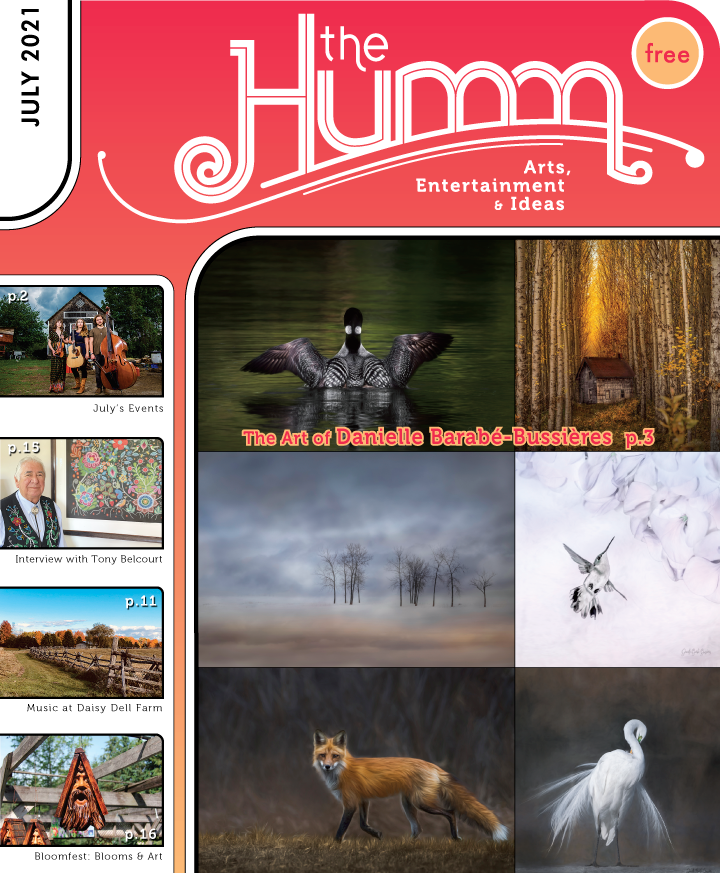“Ditch ‘Settlers' — Use ‘Neighbours'” An Interview with Tony Belcourt - theHumm July 2021
“Ditch ‘Settlers' — Use ‘Neighbours'” An Interview with Tony Belcourt - theHumm July 2021
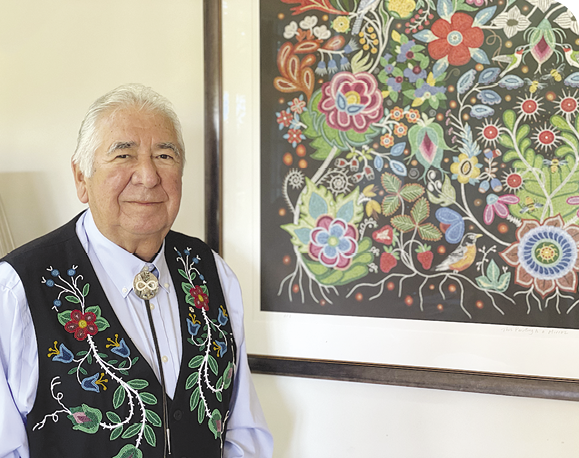
Born in the historic Métis community of Lac Ste. Anne, Alberta, Tony Belcourt’s career spans over 50 years of experience and significant achievement in Indigenous affairs, the corporate, government and not-for-profit sectors. As founding President of the Native Council of Canada (1971-1974), he was instrumental in creating a national voice for Canada’s Métis and Non-Status Indians, and his efforts were an important contributing factor in the Métis being recognized in the Constitution Act, 1982, as one of the Aboriginal peoples of Canada. Mr. Belcourt was the founding President of the Métis Nation of Ontario, and helped to achieve recognition of existing Métis Constitutional rights in the 2003 Supreme Court decision in R v. Powley. He participated in numerous meetings and conferences of the United Nations and the Organization of American States, including the negotiations on the UN Declaration on the Rights of Indigenous Peoples. Tony received the National Aboriginal Achievement Award for Public Service in 2006 and an Honorary Doctorate of Laws from Lakehead University in 2010, and was appointed an Officer of the Order of Canada in 2013.
Now residing in Almonte, Tony recently wrote a letter to The Millstone News millstonenews.com/flag-at-half-mast-at-mississippi-golf-club/ about his reaction to the flag at the Mississippi Golf Club flying at half-mast for the children of the Kamloops Indian Residential School. In that letter he wrote: “It gives me some hope that we may finally be able to turn the corner on racism and prejudice against Indigenous peoples in this, our home and native land.” That response prompted Millstone reader Fern Martin to suggest that theHumm interview Tony Belcourt, which he very generously agreed to.
theHumm: When a story like the Kamloops Indian Residential School makes the news, what kinds of responses from non-Indigenous people are helpful or welcome to you? Are there responses that are not so helpful?
Tony Belcourt: The response to me personally to me and to my friends at the golf club has been really quite something. Even yesterday, someone I have known for years came up to us and said how sorry he was. I find that a bit embarrassing, I mean – don’t apologize to me. He said he had no idea, he considers himself a pretty intelligent guy, well-read, but he said he had no idea. That kind of surprised me a bit. The other thing he said was that “I wasn’t taught this in school”, which is understandable — I don’t think I was taught it either — and he said “I didn’t get anything in major news media”. And I thought that was strange because the Truth and Reconciliation Commission was really covered from end to end. I guess it must have seemed esoteric to people — no connection or something. But this story has really connected. There’s no question that it has connected. And I do get people who are asking “What can I do?” and so on.
I learned about a group of residential school survivors in Vancouver irsss.ca/home , and there’s another group in Victoria ourplacesociety.com — I think it was Fern (Martin) who told me about these. And if people are interested in helping the survivors, there’s one way to do it. I’m going to organize a busking jam with my friends in Ottawa, and I want to raise a little bit of money. That’s what I want to do, and I’m going to raise what I can and send it out there. [That event raised over $1,780 for the Residential School Survivors Society irsss.ca/home , and you can read more about it here: rootsmusic.ca/2021/06/23/songs-for-the-revolution-buskers-for-residential-school-survivors/ ]
When we spoke on the phone, you mentioned that back in the 19th century people in some of the small towns of the Ottawa Valley had helped to finance the government troops fighting against the Métis in the Battle of Batoche. How can learning more about the history of events like the Battle of Batoche help with relations between settlers and Indigenous people?
Yes, the other thing is for people to learn more about what’s behind the history of the residential schools, and what’s behind the history of deep-seated and systemic racism in Ontario against particularly the Métis people. I’m finding it difficult to figure out how to reach people about that, because it’s still there.
It has its roots in the so-called Riel Rebellions of 1870 and 1885, when the Orange Order in southern Ontario not only influenced but controlled governments — Sir John A MacDonald was one of the most prominent members of that order. The Order’s roots were in Ireland, and the Protestant hatred against the Catholics was at the root, as well as anti-French sentiments. I don’t know if people know about the cabin fires down near Peterborough, where there was a volunteer fire brigade that would burn down anybody who was from Quebec.
In about 1998 or 2000 a group of us had arranged a trip down to Millbrook, which is near Peterborough, to go to the Legion there which was housing its prized possession — the Bell of Batoche. The militia, which had been organized by the Orange Orders in southern Ontario, had volunteered to go out and fight Riel in 1885, and they brought back what they called trophies of war. The bell was a really important thing to the Métis people in Batoche — aside from following traditional spiritual values, Métis people also were Catholic. The churches really went out of their way to baptize anyone they could when they got to the Prairies. And so people became really attached to things like the bell that rang every Sunday and brought people together. Think about the bell in Almonte — when that rings, everybody knows it’s church time! So this was an important trophy.
Now the Legion in Millbrook wasn’t the only place that had these kind of trophies — I’m trying to research other ones as well — and they also had medals that were prized possessions. There were medals from the Battle of Batoche that were in cases along with medals from those who had served in WWI and WWII.
So after Riel was hanged in 1885, what appears to me is that people in Ontario pretty well felt “well, that’s the end of the Métis”. They did not know, or weren’t cognizant of the Métis communities in Ontario, which were pretty well north of the French Line except for huge communities in Georgian Bay. There were Métis communities in and around Pembroke and the islands there, on both sides of the border, but they gradually dissipated, although there are people there now who are descendants and who are just coming forward.
When we started the Métis Nation of Ontario in 1993 and applied for funding from the federal government — which was providing funding to all Indigenous organizations to establish programs for housing, education, health and welfare, and economic development — the government refused to fund the Métis Nation because their official position was that there were no Métis in Ontario. We fought that, and they eventually gave in and said “well, yes, but you have to be organized for two years and have financial statements that prove that you can handle money.”
What eventually happened was that in 1993 one of our people had shot a moose. His name was Steve Powley, and he and his son Roddy shot a moose up in Sault Ste. Marie. In those days our people could get moose tags for a calf but never for a bull moose, which have the really good meat — that’s their sustenance. Even today there are people who supplement whatever earned income they can get, especially if they are working seasonally, with provisions for the winter. So the meat is really important to them, and part of their diet too. Steve was sick and tired of being charged, going to court, paying a fine, going back out and hunting moose but leaving it in the woods until dark and going back in the danger of the evening to cut it up and bring it in. So he said to heck with it — he put his moose on the top of the truck, drove right in front of the Ministry of Natural Resources, went back to his house, and while he was dressing it they charged him. And he refused to go to court and plead guilty. We knew that if he went to court he would lose, unless he had a really good lawyer. I knew this one law firm in Toronto that had gone to the Supreme Court in other aboriginal rights issues for First Nations (nothing had ever gone forward for the Métis). I approached them and asked him if they would take the case. One of their law students was Jean Teillet, who was the great-grand-niece of Louis Riel. She had just graduated and was articling, and she came up to meet Steve and he said “I only have one question — will you pass the bar exams?” She said she would, so Steve said “Ok, then you can be my lawyer”.
We took on the obligation — I made the commitment that we would raise the money [for the case]. We went to court in 1998 — to the Ontario Court in Sault Ste. Marie — and when we got there it became very clear that the Ontario government’s position was: #1 — there were no Métis communities in Ontario; #2 — there never were; #3 — if there ever were, they disappeared; #4 — if those communities ever existed, they never exercised Aboriginal rights according to the Constitution; #5 — if they did, those rights were extinguished; and #6 — if there are communities in Ontario, there was no connection between what may have existed back then and the ones that exist today.
That was their position, but we won hands-down. The judge was very cognizant of the importance of this trial. Then it went to the Superior Court of Ontario and we won there; then it went to the Ontario Court of Appeal where three judges sit, and we won. We got to the Supreme Court of Canada in 2003 and every province in Canada, the two territories at the time and the Federal Government were all on one side, and there was little Jean on the other defending Stevie. And we won. It was a unanimous decision of the Supreme Court that the Métis right to hunt and fish for food was still a Constitutional right — it had not been extinguished. Which raises the question — well, do land rights and other rights still exist in Ontario? How about the right of self-government and self-determination, which are Constitutional rights?
I think it was in 2008 — the year I retired — that the Premier’s office called and asked me to bring my Executive down to the legislature, and they announced that the Government of Ontario was going to officially recognize the Métis Nation. That was phenomenal.
The battle with the Ontario government and particularly the Ministry of Natural Resources and those that have this deep-seated prejudice still exists, unfortunately. On the very positive side of the ledger, the Federal and Provincial governments both agreed to enter into framework agreements in 2017 with the Metis Nation of Ontario and groups out west. It lists all the things that are going to be negotiated. One of the things that isn’t specified yet is land. That’s actually why I came to Ottawa — to fight for land. So those negotiations are going on now.
One of the challenges for people of my vintage is that many of the sources of our historical information were entirely from the settlers’ point of view. Even now, when I Googled the Battle of Batoche, many sources seemed pretty biased. Can you give me any suggestions as to where to look or how to look for sources of information that better represent Indigenous points of view? And/or that could help people become better allies?
Oh boy — that’s a really good question. CBC Radio has some good programs and several Indigenous hosts. The Métis Nation of Ontario has a really good website metisnation.org , as do the Chiefs of Ontario chiefs-of-ontario.org . Minwaashin Lodge minlodge.com in Ottawa helps women who are going through trauma of various kinds. The Inuit have a community centre of their own, and there’s the Odawa Native Friendship Centre odawa.on.ca . The Gabriel Dumont Institute gdins.org in Saskatchewan is also one of the best sources of Métis information.
I noticed that some of your children are artists and filmmakers. Since theHumm is an arts publication, I’m hoping you can speak to the importance of the arts in the process of healing and reconciliation.
They are all artists in their own right. My daughter Christi Belcourt christibelcourt.com is quite well known internationally. Her works are in museums in Europe, in New York, and all across Canada. Her artwork is based on Métis beadwork. The Métis people were called the Flower Beadwork People, and Métis men were the most well-dressed and well-adorned men on the Prairies. Mothers, grandmothers and wives made the clothing for everyone. I grew up wearing moosehide clothing and moccasins — they are just the greatest in the winter. Christi studied the beadwork that has been and is being done, and she started painting floral designs. Then she got the idea of using the point end of a paintbrush to “paint” beads.
Shane Belcourt shanebelcourt.com is a filmmaker who has done several features. One of his first was called Tkaronto — which is the original name of Toronto. It’s a story about “guy meets girl” — he’s Métis in Toronto, and she is First Nations from Ontario living in Vancouver. She doesn’t know anything about her culture and he does. It’s really quite a touching story, done on a shoestring budget. Shane has also done a lot of documentaries on Indigenous people. His film Red Rover got a lot of international attention, and now he’s been sought out by some producers in good old Hollywood. He’s also an amazing director. He directed a really interesting television series for APTN called Amplify, where he asks a musical artist to create a song or a piece based on an inspiration — a person, a thing, in some cases a book — and he documents the story of it right from beginning to end.
Suzanne Belcourt is a professional graphic designer and aspiring writer. She was diagnosed with schizophrenia 27 years ago with undiagnosed obsessive-compulsive disorder. For the past twenty years she has designed, among other things, various logos, movie posters, DVD cases, promotional material for directors and producers, as well as CD cases for various musicians. She is currently writing her third screenplay. [Tony was initially hesitant to let us publish Suzanne’s name, but when he called her to ask permission she responded that she would like people to understand that those who have mental illnesses can — and want to — contribute to society in positive ways and that they are often just misunderstood.]
Your extensive career has spanned over 50 years of working on Indigenous affairs. In your opinion, what issues still need addressing?
For me the biggest issue that needs to be addressed is education and dealing with prejudice and myths. Racism is a terrible thing — I grew up having to deal with it, and it still exists. The whole thing with that Muslim family — what is behind all of this? Why are people so indifferent to one-another? You go downtown in Ottawa and there are a lot of street people there — they are the generations that are suffering the ravages of the residential school systems. And it’s not just the Indian residential school systems – it’s orphanages and everything else. And people are so mean to them and indifferent — they don’t want to do anything except walk around and hold their noses. That to me is the biggest issue facing Canadians.
The biggest one still facing the Métis is the loss of our lands. That’s another story people don’t understand. The government took the position that by issuing these pieces of paper called scrip in 1885, they extinguished our rights, and really it was a huge theft of our land.
Have you seen changes over those years that give you hope for relations between Indigenous people and settlers?
Absolutely. And — this is my personal preference — I do not like the word settlers. I don’t consider you a settler — you’re a neighbour. We have a word in Cree that means “all our relations” — wahkôhtiwin. There was a time when there was such a thing as settlers, but people today aren’t settlers. I find it sort of semi-offensive in a way to call someone a settler. There are some groups that call themselves settler organizations, and I don’t know why they do that. I don’t know why that would make them feel good — it doesn’t make me feel good I›ltell you that.
But the answer is yes — there is a great deal going on. There’s a group here in Almonte called All My Relations mmallmyrelations.ca , and also the Lanark County Neighbours for Truth and Reconciliation lanarkcountyneighbours.ca . They are hosting some very important gatherings.
Danielle Barabé-Bussières: Nature/Wildlife Photographer - theHumm July 2021
By Sally Hansen
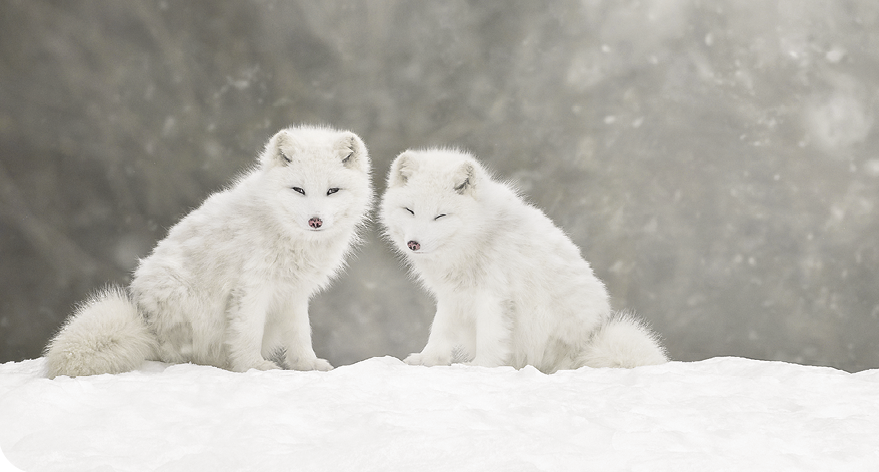
Art… and Soul
“Nature is the place to be,” according to nature and wildlife photographer Danielle Barabé-Bussières. Danielle celebrates her love of the natural world by capturing stunning images and transforming them into works of art. She has a gift for composition, a talent for exploiting the extensive capabilities of current post-processing software, and the dedication and patience needed to create an extraordinary photographic work of art from an excellent photograph.
Take a ......
Red TrilliumStudio Tour, July 3 & 4 - theHumm July 2021
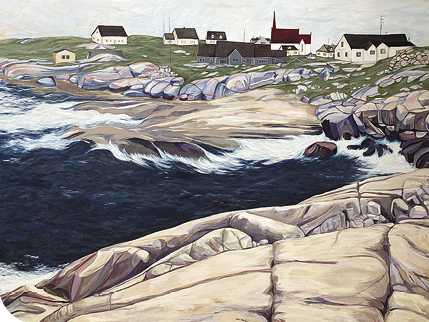
The 43rd Red Trillium Studio Tour will take place over the weekend of July 3 and 4, showcasing the studios of some of West Carleton’s most talented artists and fine craftspeople. Just twenty minutes beyond Kanata into the scenic countryside around Carp, Dunrobin and Kinburn, you will be welcomed at studios featuring paintings, jewellery, sculpture, photography, woodturning, pottery, glasswork, designer clothing and fine art textiles.
Artists will be on hand to discuss their wo......
Almonte Celtfest is Turning 25! - theHumm July 2021
By Makayla Moore

Celtfest is a free afternoon of Ottawa Valley and Celtic entertainment, typically performed in the natural amphitheatre of Gemmill Park in the heart of Almonte, that has moved online almonteceltfest.com for the 2020 and 2021 installments of the festival.
It is hard to believe that this long-running event has been bringing the community together in Gemmill Park (and online) to dance, sing, and celebrate all things Celtic for 25 years!
......
Pleasure in the Small Things Part 3 of the Clothesline Saga - theHumm July 2021
By Glenda Jones

My clothesline suffered a slow and painful collapse one day last fall, and after a couple of estimates I convinced myself I could use a lot of dryer time for what it was going to cost to erect a 14-foot pole and re-string that line. But every wash day through the winter I yearned for the fresh smell of frozen laundry. I was tired of lint on the dark clothes, jeans shrinking, socks disappearing, everything in a wrinkled tangle like day-old spaghetti. I needed that clothesline.
A casual c......
MidSummer Herbfest A Virtual Celebration of Healthy Living - theHumm July 2021
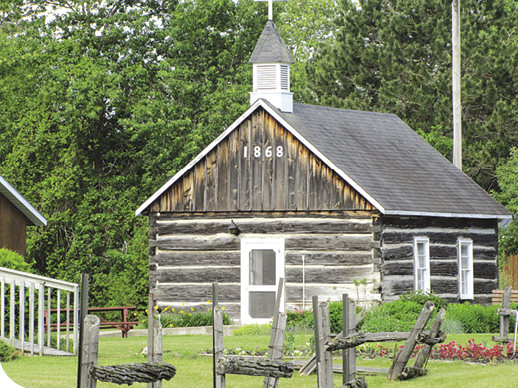
MidSummer Herbfest is going virtual again in 2021 with a week-long event running from Sunday, July 25 to Sunday, August 1. Stay tuned to midsummerherbfest.ca for more details about this celebration of healthy living. This year, Herbfest will be showcasing parsley — the international herb of the year. You’ll find musical sets from Ottawa Valley artists Vicki Brittle and Khloe B Music, as well as online vendors, videos, kids’ crafts, an......
Music at Daisy Dell Farm - theHumm July 2021
By Kris Riendeau

As we emerge from months of lockdown and take our first tentative steps back into the “real” world, one of the first experiences many of us are seeking is that of live performances. Remember that elusive but transformative feeling of sharing a great vibe with musicians and fellow audience members? Tapping your feet and grooving along, mouthing the words to your favourite songs? Fortunately for the Ottawa Valley, Barb (Mattiacci) McIlquham recalls all those great feelings, having experienced them both as......
Three Artistic Outings in the Valley - theHumm July 2021
By Miss Cellaneous
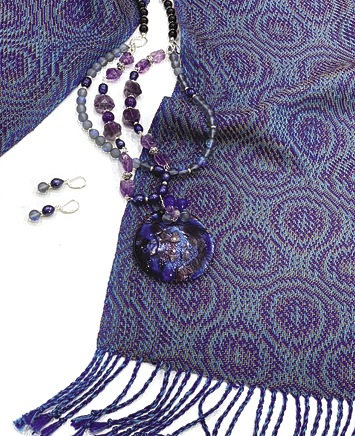
Strévé Gallery Celebrates Canadian Local
In celebration of Canada’s Birthday and the Support Local Movement, Strévé Design Loft Gallery is featuring three Perth area artists and artisans during the summer months. Owner Cheryl Straby explains that: “supporting local emerging and professional artists has always been the mandate of the gallery since moving into my wonderful space three years ago. I guess that’s reason enough ......
“Ditch ‘Settlers' — Use ‘Neighbours'” An Interview with Tony Belcourt - theHumm July 2021

Born in the historic Métis community of Lac Ste. Anne, Alberta, Tony Belcourt’s career spans over 50 years of experience and significant achievement in Indigenous affairs, the corporate, government and not-for-profit sectors. As founding President of the Native Council of Canada (1971-1974), he was instrumental in creating a national voice for Canada’s Métis and Non-Status Indians, and his efforts were an important contributing factor in the Métis being recognized in the Constitutio......
Radiothon To Support Local Land Trust - theHumm July 2021
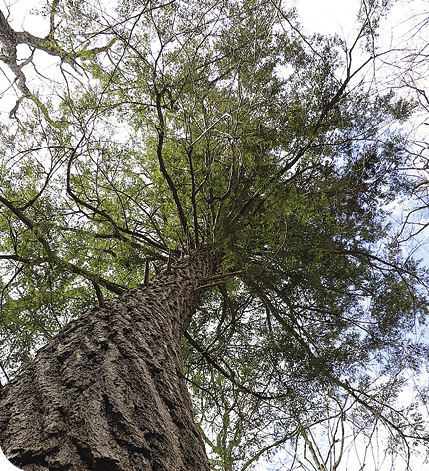
Submitted by Carolyn Piche
It’s no secret that our forests and wetlands provide us with countless environmental and health benefits. Being in wild areas can lead to improved emotional, spiritual and physical wellbeing, while Nature purifies our air and water. Wild areas are also a key resource in our efforts to slow climate change because they sequester large amounts of carbon from the atmosphere.
Were you among the thousands who visited the Mississippi Madawaska Land Trust (MMLT......
Bloomfest Garden Art Show and Sale - theHumm July 2021
By Suzanne Patry
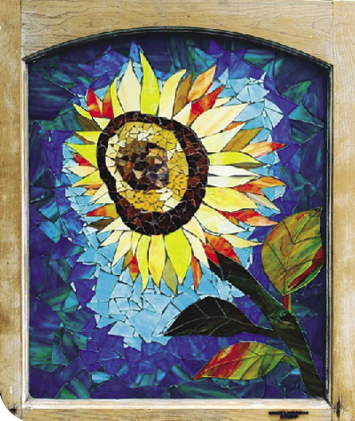
Last year, during the third week of July, Whitehouse Perennials hosted our first garden art show and sale. Late July is a particularly beautiful time because the display gardens and daylily field are in full bloom. It was a great success, and customers and artists were enthusiastic about making it an annual event. Beginning on July 21, the work of 14 artists will be installed throughout the three display gardens and the daylily field. The art will remain in place until August 2. The gardens ar......
A Lifelong Learner, Still On the Go - theHumm July 2021
By Sally Smith

There’s a “thief” in Araina Clark’s life.
“It takes away a lot of things, things you never realized it could, but one by one it marches through and takes….” Araina talks about the thief bluntly: “Reading has become more challenging. The thief took it early.”
She talks about “him” waiting around a corner, waiting to steal again next week, next month, in a few minutes.
“For me, the progression [of Parkinson’s Disease] has been slow, but I felt every loss, was amazed how my life was broken do......
Putting the “Live” Back in Live Music - theHumm July 2021
By John Pigeau
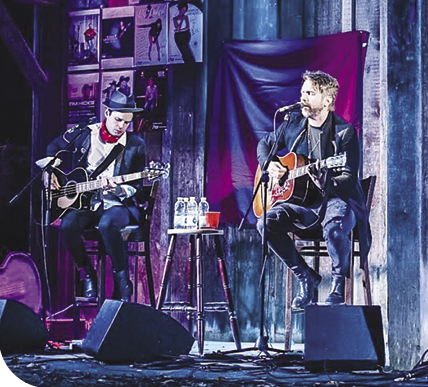
With live music venues set to open outdoors again, I actually feel a little silly trying to write about the transformative power of live music. I can’t, really. Because that power comes from the genuine human experience between musician and audience — and that transformative power is created live. In the moment. With music and voice, spontaneous gestures and impossible-to-describe feelings. And anyone who loves live music knows that. They don’t need it explained to them; they merely need to he......
Cross-Cultural BioBlitz with Youth Circle - theHumm July 2021
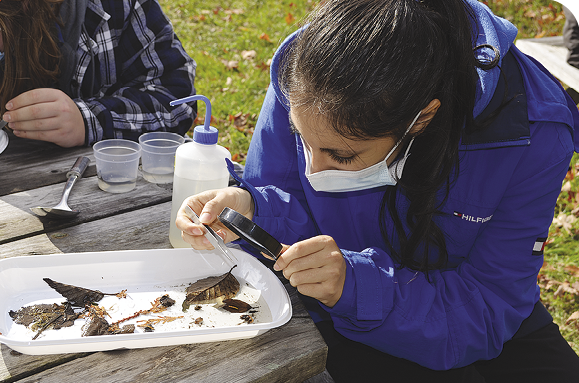
Submitted by Joanna Jack
Youth Circle for Mother Earth (YCME) will be hosting a youth-led BioBlitz across Ontario, online and on-site at the local Plenty Canada headquarters over a two-week period during the month of July. A BioBlitz is an event that involves searching for and identifying as many species as possible over a short period of time. Not only will this event be a fun and exciting way to contribute to crowd-sourced western science, but participating youth will also be contributing to I......
New Books byBlack Authors at the Mississippi Mills Library - theHumm July 2021

My name is Renée Kokonya Sullivan. I am from Kenya and have been living in Canada now for four years. I didn’t have a library growing up. I loved to read though. My only books were my textbooks from school. I loved reading through them, especially my English and Swahili books. The first time I entered a library was in university. I was in awe! So many books, such little time. I was hooked. Libraries and bookstores became some of my favourite places to hang out. I loved the smell of books, the qu......
How-Tos for Happier Hiking - theHumm July 2021
By Vickie Walsh
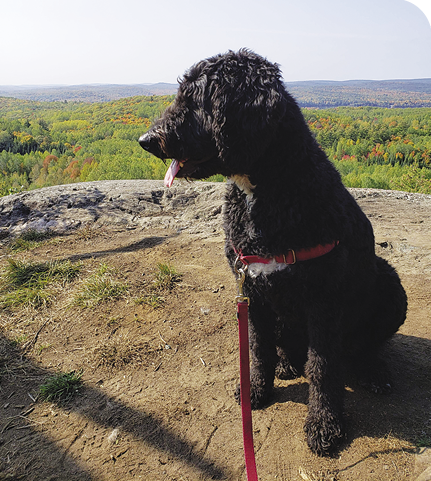
Are you prepared for emergencies while hiking? Is your child? Do you have supplies and know how to care for your dog?
Now that provincial restrictions are lifting (knock on wood), mud season is over, and maybe, just maybe, the worst of bug season is behind us — hiking is in full swing! Whether it’s inner-city trails or country escapes, there are plenty of trails (literally hundreds upon hundreds) for us all to enjoy. Safety is sometimes an afterthought when it comes to getting......
Two New Exhibitions at the Textile Museum - theHumm July 2021
From July 17 to September 18, the Mississippi Valley Textile Museum presents exhibitions of works by Murray Gibson and Donald Stuart.
Murray Gibson is a master artisan and member of the Royal......
Perth Manor: the End of an Era - theHumm July 2021
By Kris Riendeau
Gordon and Linda Craig have owned and run the Perth Manor Boutique Hotel for the past ten years, during which time they have made many contributions to the cultural and musical scene in the Ottaw......
Declutter for a Good Cause! Fundraiser for the Carleton Place Hospital - theHumm July 2021
You can now declutter and support the Carleton Place hospital at the same time!
The Carleton Place & District Memorial Hospital (CPDMH) Foundation is thrilled to announce it has partnered......
MERA 2021 Award of Excellence - theHumm July 2021
By Submitted Helen Mogford
MERA (McDonalds Corners & Elphin Recreation & Arts) is delighted to announce that Fred Fowler is the recipient of the 2021 MERA Award for Excellence in the Fine Arts and Fine Crafts, with......
Building for a Bright Future How our Expanding Rural Population Can Help with the Climate Crisis - theHumm July 2021
By Chandler Swain
Lanark County will see many new neighbours move to our towns, villages and countryside in the coming years. All the homes these folks will need must factor into how we manage to slow down and rev......
60+ Hockey Coming to Almonte - theHumm July 2021
By Al Foubert
I will be moving to Almonte this October and wanted to pursue some gentle-manly and gentle-ladies hockey. Most leagues in the area had younger players mixed with seniors and in most cases it is d......
Update on the Blakeney Project Garden - theHumm July 2021
By David Hinks
I wrote a few months ago about the Blakeney Project — a two-acre field in Blakeney that has been leased (free of charge) to the Lanark County Food Bank (also known as the Hunger Stop) to grow fre......
Winning Big with the Hospital Lottery - theHumm July 2021
At first glance, Audrey Kealey and Jordan Waito don’t appear to have much in common.
Audrey is 81. Jordan is 22. Audrey is retired and lives in Carleton Place with her husband Brian. Jordan i......
Summer at Your Local Library - theHumm July 2021
By Amanda Robinson is the CEO of the Lanark Highlands Public Library
Summer Readingat the Lanark Highlands Library
The Lanark Highlands Public Library has had a very busy spring. We have continued to work on improving access to our coll......
Cubacan Bikes Sending Two-Wheel Lifelines to Cuban Families - theHumm July 2021
A volunteer group is collecting used bikes throughout Eastern Ontario to send to Cuba, and is asking local people for donations and help.
“More than a million Canadians normally travel to Cub......
That’s Me In Here by Cliff Bennett - theHumm July 2021
Cliff Bennett, a lifelong resident of the Almonte and Carleton Place area, has written a collection of his memories called That’s Me In Here. Over the past 89 years, Cliff has been active in......
Truth and Reconciliation Program for Youth - theHumm July 2021
The Plenty Canada team is excited to announce the third year of their Truth and Reconciliation Training Program for Indigenous and non-Indigenous youth aged 15-30!
This year’s program will r......
Step Up and Dance! - theHumm July 2021
Dawn Dewar has been teaching Ottawa Valley Step Dancing for years, and when the pandemic made it impossible to do so in-person, she “pivoted” (dance pun intended) and decided to offer virtual cla......
Summer Movie Picks - theHumm July 2021
By Matt Roche
Summer is upon us, and this is the time for blockbusters and money-makers, for a quick escape into the dark cool movie theaters, supplying crisp air and buttery popcorn, for movie lovers to gathe......
Apr 20 Perth Trashure Hunt Clean-up
Apr 20 Solitary Man
Apr 27 Festival of the Maples
Apr 27 The Moth Project
May 4 - 5 Spring Fine Art Show
May 4 Outskirts
May 5 Music at Mera: The Andrew Collins Trio
May 11 - 12 Art in the Attic
May 11 Engelbert Humperdinck & Tom Jones Tribute
May 16 MMLT Talk & AGM
- IS THIS A PROTEST?
- A Classic Whodunnit Agatha Christie’s Black Coffee at Studio Theatre
- Readers, Writers, and Poets
- Celebrate Indigenous Culture in CP
- Celebrate the ClassicsWith the Arnprior Choir
- 4F Auction Concoction Food, Fun, Fashion & Favourites
- Cheerfully Made Spring Market
- Electrify to Decarbonize Lanark
- Volunteer Forum
- Frankenstein Comes to The Station Theatre


